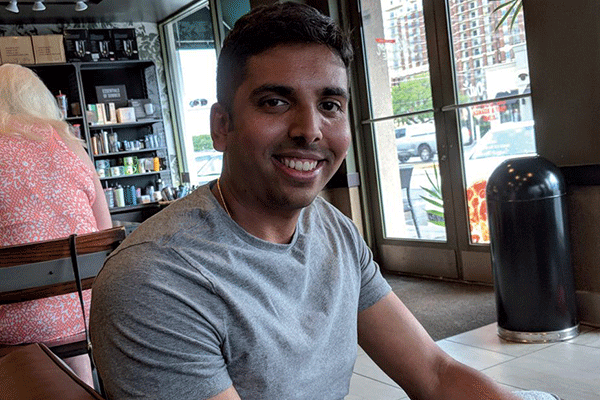For many American companies, China is land of opportunity

Santosh Bhavani, founder of SemanticMD, is ready to move to China to pursue opportunities in healthcare this summer. [MAY ZHOU / CHINA DAILY]
For Santosh Bhavani, founder of Houston-based SemanticMD, China is the place to be for business. He made up his mind to move to China this summer.
"I was happy to find out that the InnoSTARS competition was happening right here in Houston during the US China Innovation and Investment Summit," he said.
Bhavani said that he discovered it through a post in his WeChat circle. He has built a WeChat network of more than 70 people during the last two years. He often uses Baidu to search for such competition opportunities.
His AI for medical imaging reached the semifinals of the InnoSTARS Competition and will compete in the final to be held in China in November. More than 700 US companies applied for InnoSTARS.
However, Bhavani won't wait until November to go to China — he is going to Hangzhou in July for another innovation competition to meet with more potential investors he met at the summit and to settle down in China.
China provides a big homogeneous market where there is a lot more excitement and interest in AI investment, and more than 50 percent of the world's investment in medical imaging AI is happening in China, Bhavani said.
"Physically being there, there will be a lot more opportunities to pursue. There are AI companies in all sorts of pockets in the world; they don't collaborate as well as China across geographical locations," Bhavani said in giving his reasons for moving to China.
In addition, the best companies in medical imaging AI are in China right now.
"I could partner up with one there; that could be interesting," he said.
Bhavani is bringing to China two AI medical technologies – AI for tuberculosis detection by analyzing chest X-rays and AI for invitro fertilization procedure —developed by his own company SemanticMD, a company he founded.
China has abandoned its one-child policy, and many people are embracing the opportunity to have more children. However, a lot of Chinese women are having trouble getting pregnant. Some of them have been coming to the US seeking fertility treatment.
Bhavani wants to capitalize on such high demand and bring the technology to China.
"We have worked with the largest US clinic to develop software to help make fertility decisions. This AI technology uses the history of all patients to recommend fertility treatment and predict pregnancy outcome for each patient. The automated decision-making helps to save money and time and improves outcome for the patients," Bhavani said.
The AI technology has been used in more than 50,000 fertility treatments. After further improving its algorithm and completing a clinical trial, it will be ready to be used. It will take about a half year to accomplish all that, according to Bhavani.
Bhavani, who grew up in Houston, studied computing and statistics at Carnegie Mellon University (CMU) in Pittsburgh, then did research in machine learning in Switzerland. He went back to CMU to get a PhD in computational biology but left school for now to focus on the AI technology he developed.
Bhavani plans to apply China's Ten-Thousand Talents Program to continue his research and launch his product in China. He got an offer from the Zhuhai Institute of Advanced Technology and is in the process of term negotiation.
He is also talking to Xi'an Jiaotong-Liverpool University, an international university based in Suzhou, which also can offer him a spot in the Ten-Thousand Talents Program.
Bhavani also wonders about opportunities in Hangzhou, Shenyang, Tianjin and a few other cities. The opportunities are so abundant that even though he does not know where he will land in China, he will move to China in a couple of months.
Bhavnani is only one of many American entrepreneurs who see great potential in China. The summit's InnoSTARS held in cities across the US has become an attractive platform with more than 700 US companies applying, according to Zhang Shuoyang, president of Z Lab and organizer of the summit.
"A company named PhDsoft was put on the wait list at the competition in Houston. They didn't give up and decided to enter the competition held in Boston. This is the second time they participated in InnoSTARS. This demonstrates the strong desire of many US companies to do business with China," Zhang said.
Chen Hongsheng, consul of science and technology of China in Houston, said that despite the current trade issues at the federal level between China and US, the market trend will not be reversed as evident in such enthusiasm exhibited by US companies with innovative technologies.
"Today's reality is, if an American company could enter the China market, its volume would experience a dramatic increase. China is where they are able to achieve large scale-up," Chen said.
Invest in China Copyright © 2026 China Daily All rights Reserved
京ICP备13028878号-6
 京公网安备 11010502032503号
京公网安备 11010502032503号





